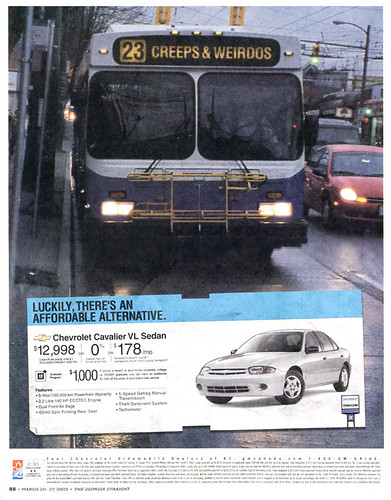The first good reason to drive in a long time--television on transit
"Inside my TV eye Never stop to wonder why" (Lyric from World Party, not Iggy) televisions are becoming a dominant feature of the third place (restaurants, bars, fortunately not coffee shops) and in various public facilities (airports, hospitals) and places where we are being sold (supermarkets, Walmart, etc.).
Television is capable of great power, as Tom Shales wrote about recently, but all too often it is drivel (sports generally: editorial comment: "They just play again next year") and in any case, it's an intrusion (see the anti-tv columns by Marc Fisher here and here). Dr. Transit shudders to think that the march of a bad idea--television on bus and subway--is approaching Washington. (See "Metro Plans To Introduce Video Ads in Cars, Tunnels" and the Scenic America response.)
 This ad by local car dealers was eventually pulled in the face of a great outcry by British Columbia transit activists.
This ad by local car dealers was eventually pulled in the face of a great outcry by British Columbia transit activists.In "MBTV", Friday's Boston Globe editorializes about the Metropolitan Boston Transity Authority's plans to put televisions in subway cars, saying that it "was probably inevitable, given that TV has invaded so many other public places, and given that the financially strapped T estimates the potential advertising revenue as $3.5 million a year."
"But that doesn't make the idea any less depressing. There's some solace in knowing that the proposal includes only the Red, Orange, and Blue lines and that the televisions will be blessedly silent, with closed-captioned programming and audio available through FM radio that riders can hear on their Walkman headsets or state-of-the-art cellphones.
Still, T-TV will be one more animated box in what was comfortingly innocuous space.
The Transit Authority -- which is calling for proposals by May 1 and would present the plan to the T's board for approval in late summer -- is expected to base the system on one adopted in Atlanta. That city is fitting subways and commuter trains with five 15-inch TV screens per car, which will run a half-hour loop of closed-captioned programming: 20½ minutes of news from a local ABC affiliate and 9½ minutes of commercials. Atlanta buses have the system, as do buses in Milwaukee, Orlando, Chicago, and Norfolk, Va. (...)
The draw for marketers is that ever-desirable ''captive audience" -- a term that should tell them people held prison to the message couldn't possibly be enjoying themselves and might think better of the advertiser that let them commute in relative peace. The MBTA should consider that, too.
What seems like an easy money-maker might be a loser if riders feel sold rather than serviced."



0 Comments:
Post a Comment
<< Home